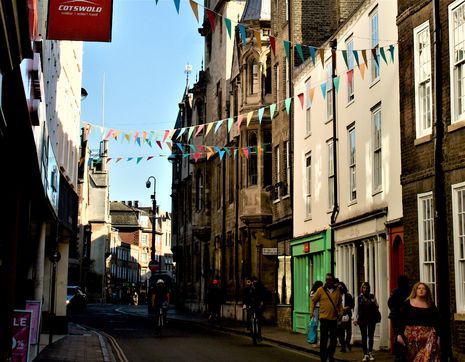Cambridge should change its no-job policy
The University’s no-job policy needs re-evaluating in light of the cost of living crisis

This week marks a year since Russia’s invasion of Ukraine. As the conflict drags on, sanctions on Russian gas continue to distort energy prices, exacerbating Britain’s cost of living crisis. Speculation abounds from pundits and politicians alike and yet there is, to date, no reassuring end in sight for the spiralling costs of basic expenses. It is in this light that Cambridge must re-examine its blanket ban on its students working jobs.
The University of Cambridge’s website states clearly that undergraduate students “are expected not to work during termtime”. While students are allowed to work during the vacation, Cambridge recommends that students should first “consult their Faculty and Department for further details regarding vacation dates when they may be able to work”. Academic pressures mean this isn’t always a viable option. Law students at my college, for instance, are expected to produce 15 essays over the vacation period.
“Paid work within colleges is not always a reliable source of income”
It is also worth noting that students are allowed to undertake paid work during term-time for their college or the university, but these opportunities vary drastically from college to college. Furthermore, paid work within colleges is not always a reliable source of income. Increasingly, these jobs are disappearing as college bars are put under private administration or in the hands of external workers, like at Clare Cellars.
Until recently, I was a staunch defender of Cambridge University’s no-job policy. I’d be the first to stand up for it when my friends at other universities or prospective students questioned the rule. Why? Because it gave Cambridge a strong incentive to provide substantial bursaries and funds for its students who are facing financial hardship.
The Cambridge Bursary Scheme for instance, provides non-repayable bursaries of up to £3,500 a year to students holding home fees status. In 2021, the scheme was extended to students with household incomes of up to £62,215. The Cambridge Bursary could also be supplemented where necessary, with financial hardship grants and support from colleges.
“Cambridge’s support had to be comprehensive to maintain its no-job policy”
Other universities’ financial support isn’t nearly as far-reaching. Bursaries at Bath and Exeter, for example, only extend to students with a household income of below £25,000.
In essence, Cambridge’s financial support had to be more far-reaching and comprehensive than other universities to be able to maintain its no-job policy.
The cost of living crisis, however, has brought additional attention to this system’s pitfalls. Cambridge’s argument over the no-job policy rests on the availability of its financial grants. If the University can’t supply adequate financial support in light of rising living costs and inflation, the argument that we shouldn’t be allowed to work in term time does not stand.
The Guardian’s investigation in 2018 found that Cambridge’s 31 colleges have a combined wealth of £6.9 billion. Combined with the university’s endowment, Cambridge’s wealth stands at a total of £11.8 billion. Despite this financial advantage, a recent Varsity investigation unveiled the disparities in Cambridge’s cost of living support in comparison to its Russell Group competitors. Some universities have given students one-off additional payments to assist them as they face rising living costs, such as Queen’s University Belfast. Other universities have followed suit, such as King’s College London, which gave £150 to those with a household income of under £42,875. Oxford, Leeds and UCL have opted to give grants or bursary uplifts of up to £500.
Cambridge’s response has been to set aside £500k for specific requests to the University’s Student Hardship Fund. In comparison to other Russell Group universities, Cambridge’s response to the cost of living crisis is meagre. Sheffield, for instance, have dedicated an additional £2.5 million to their own financial support funds. Varsity’s investigation found that “only three Russell Group universities which responded to our requests for information had increased hardship funding by less than Cambridge”.
The University’s unwillingness to provide additional financial support is even more incoherent in light of its own policy prohibiting students from earning their own income during term time. This points to a wider problem with the University’s workload – why is it that students are unable to take a job alongside their degrees, like in other universities?
The cost of living crisis has profound repercussions for students in higher education. Research from the Sutton Trust found that nearly a quarter of UK students were “less likely” to be able complete their degree because of cost pressures. If Cambridge refuses to significantly expand its financial support to combat the rising costs of living, more and more students will be left with no choice but to break the no-job policy – which many already do, by necessity. The University claims it wants to attract students from more diverse socioeconomic backgrounds. Its financial support says otherwise.
 News / Eight Cambridge researchers awarded €17m in ERC research grants27 December 2025
News / Eight Cambridge researchers awarded €17m in ERC research grants27 December 2025 News / Downing investigates ‘mysterious’ underground burial vault 29 December 2025
News / Downing investigates ‘mysterious’ underground burial vault 29 December 2025 Lifestyle / Ask Auntie Alice29 December 2025
Lifestyle / Ask Auntie Alice29 December 2025 Sport / Hard work, heartbreak and hope: international gymnast Maddie Marshall’s journey 29 December 2025
Sport / Hard work, heartbreak and hope: international gymnast Maddie Marshall’s journey 29 December 2025 Interviews / Meet Juan Michel, Cambridge’s multilingual musician29 December 2025
Interviews / Meet Juan Michel, Cambridge’s multilingual musician29 December 2025










